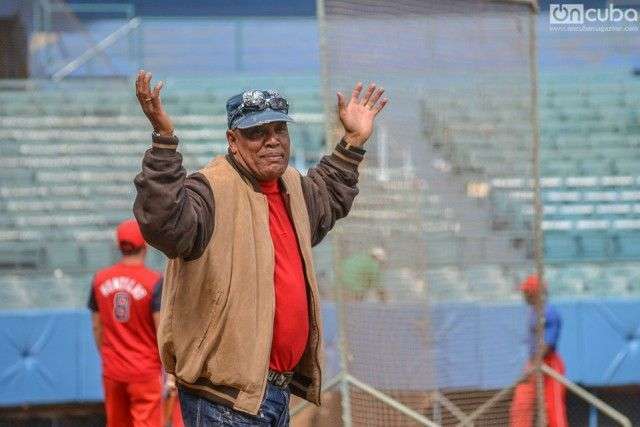Photo: Beatriz Verde Limó e Iroko Alejo
Victor Mesa does not want to talk to me, or to anyone. But that’s impossible. It’s to ak for an impossible. Victor Mesa cannot live without talking. He is a logocentric, he loves to hear himself, and in an environment like the Cuban baseball, where people are too careful and do not speak or when they do they mumble a set of trifles and no substance, and that is, in itself, sufficient merit.
I’ve caught him at a bad time. Mesa just lost the WBC at the helm of the Cuba team, and on Tuesday, in the resumption of the National Series, during the first series Matanzas against Industriales, he was ejected from the Latin American Stadium in front of thousands of spectators and millions of viewers.
The entire country witnessed, sequence by sequence, how Mesa went too far with the umpire, as he tried to withdraw his team from the field and sent out a position player to pitch, in defiance of the authority of Melchor Fonseca, the umpire, who seconds before had ejected pitcher Yasiel Lazo, by two dubious dead balls in a very open game. Although, I must say, without any warning.
That same day, the National Commission had issued a decree that regulated the specialization in the use of pitchers, so the Mesa’s decision was taken as a doble outrage. The national media made a choir, Internet publications, blogs, people on the street, all of them repudiated the actions of the manager, and Mesa, accustomed as anyone to wade into the vortex of the storm, is now on Thursday morning March 28, particularly upset, enraged with the media, willing to fight alone, with his character, his intuition, his power and, if necessary, his stubbornness as the spearhead.
‘Good morning,’ I say. Mesa checks the training of your team, dispersed by the Latin American stadium turf. “I come for the interview we agreed on.”
-Good morning. What would you ask? Let’s see.
‘Well, let’s talk about the performance of the Team Cuba in the Classic.
-No, not that. Everyone has asked me about that already.
– Who interviewed you? I have not seen any interviews.
-No, no, no way. There is nothing new to say about the Classic. I have been asked everything.
-But I’m going to do a different interview, the questions nobody has asked.
– Yes? What question you’re going to ask me? Let’s see. Tell me.
Mesa catches me off-balance. I do not know what to say. I pulled out a notebook. I glance at the questions and there is none particularly different.
‘Well, but let’s sit down, and talk” I am looking to buy some time.
-Nah, leave it. They all told me the same thing, and then I read what they write.
-In the third game of the playoffs against Industriales, Ariel Sanchez drops a fly ball starting the game and you commented that you knew right then that you couldn’t win. Was there such a moment against Holland?
-No, I knew I could beat Holland. That’s the problem. I never thought I’d lost.
– And when Simmons hits the homer and ties the game?
-Not even then. I knew if we could prevent them from scoring we would score one.
– If we could prevent them from scoring in the bottom of the ninth?
-Also. But you saw what happened. Eighteen things happened, you are mentioning seven or eight, but it was eighteen, and that is very difficult for a baseball team. It’s like that boy cannot catch a fly ball (points precisely to Edel Tamayo, who came last night to play the left field, now trains in that position and on Tuesday, against all odds, stood on the mound to the surprise of the public) when I can catch them all. How can I catch a fly and Tamayo cannot? Yesterday he dropped two, four runs they scored because of him.
– Just like Yulieski Gourriel errors at third base?
-No, stop that. It’s like the father talking evil of his son. I cannot speak. Look, give me a hug, I love you, but I cannot grant the interview, I cannot. If it of something else, we do it, but the Classic, Gourriel, Netherlands … the same no. What are we going to win? What can I say that can go well in this interview? Remember, for you to learn, that as a journalist you have to swing for the fence.
– What do you think of the Cuban press?
-No, I cannot talk about it; it is not up to me, but we never look good to you
-You cannot judge me for me for the work of others. It’s like I were to do the same with you.
-No, you can judge me, why would I care if people judge me?. But all the same, no one writes about what the house is missing, or that the roof is falling. All of you are the same. It’s the same movie. How old are you?
-Twenty-three.
‘I am fifty-six. Even those who are dead have said that you are saying. There is no one to talk about and then they talk about me.
‘Maybe if I bring some work of mine you get convinced.
-Bring them to me.
-I have spoken highly of you, I am from Matanzas.
-No, I do not want you to speak well. I like the critics.
-The day you do something that I don’t like, I would say it too.
-Look for that one then. See now, all against me. But I’m used to. I like to fight alone.
‘Perfect, let’s leave the Classic alone. What happened on Tuesday?
– Tuesday? Nothing. I am the manager and I do what I understand. You eject my pitcher without giving me any warning … ah, well, I’ll put a pitcher without warning. He ejected me. What about Wednesday? No one came. Now today it will be crowded, because people come to see me, yell at me to get me, they do not mind the cold. Le show, c’est moi.
– Do not you think that sometimes too excited, that you make mistakes?
– See? That’s your problem. If you think so, write it down.
-No, I do not think anything, I just wonder.
Look, I’ll give one answer and I’m not going to talk more. If I do what people said, put a pitcher on Tuesday, I could not win yesterday. Yesterday I put all the pitchers I had, and I almost did not win the ball game. It means that if I do that the day before, I did not win on Tuesday or Wednesday and today I would have no one either. This is to qualify; it is just beginning, then the newspapers publish that people are waiting. Waiting for what? That was a game in the series. People are not expecting anything. The Classic is over. And I have to qualify. To do so, I have to put the pitcher that I understand.
– Why did you have the Cuba Team sluggers bunting?
– Why you do not you ask the Dominican manager why he had his cleanup hitter bunting in the first inning?
-Because the manager of my country is you, not the Dominican one.
-Go, and ask there first and then I answer. I bunt because I’m the manager and I do what I understand. Here they were bunting since July. If you do not know how to bunt, it’s your problem. Besides, I tell you, this is just a moment. Look for the second option, you just cannot live out of this, he points out at my notebook and refers to journalism. The second option. And it is not about the girl or the house. Understand it if you can. If they take me out of here, I have where to go. Even in America they are looking for me, imagine that, and I’m here. Even in America. See if they want to take you there. Then?
– Are you going to stay in the Cuba team?
-If I tell me so, I will. And if they remove me, they just do. Meanwhile I will enjoy it. Where I am really going to stay is in my house.
Mesa moves away, walks to the batter’s box, and evaluates Tamayo. This morning, Tamayo has to train everything. Mesa says that squeeze hard with right hand when wielding the bat. He hits the ball hard and Mesa expresses his aproval. There is no one else, he says, is you. Why do you hit a ground ball to second, he says, why. Aim for the gap. The man is you, Mesa repeats.
He goes up the decks and sits above the visitor bench. I chase him.
-You always say you know which player is good at any moment. Who has the goods and who doesn’t. Have you had planned, in case of any eventuality, to move José Miguel Fernández up to the third position in the lineup?
-That is the question my son would make me. Of course I had thought about it. Everything is designed. Or do you also believe that I do things like crazy?
But bunting with the sluggers seemed to be planned beforehand and it went wrong.
-Here they bunted for months, and they did well. The problem is that you do not know. Abreu started as an outfielder, and is best bunting on the team. But you did not see that, son, you were ten years old, you have not seen ball, what would you know?
-Yes, I know, Abreu started very young. But if you do not train it, you lose it. The Classic is not to learn.
-What is it with you?. Wondering why I order a boy to bunt. That’s why we’re standing here, and do not move forward.
-I am asking you so you can explain me.
-No, not me. That your colleagues can explain it to you.
– Is there no Cuban journalist that you consider good?
They’re all good, but sometimes they don’t know what they talk about.
– Is there no one to rescue?
-Enough. I have nothing to talk about. I told you I have nothing to talk about.
I was silent for a while. Mesa talks about something else: the country, for example, and Edel Tamayo, who has returned to the outfield.
‘Look,’ he says, that one he caught is harder. But there are no people, no TV. That goes in the blood. How was it that Victor Victor caught them all last night? Ah, but when I had him played everybody said I was rushing things. Not anymore. They don’t tell anything anymore. It is like that. So. Yesterday Urgellés approached me to talk about the boy.
– Are you hard on your son?
-You do not want to know.
– Tougher than on others?
-No, I treat them all the same. Why did I bench (Ariel) Sanchez last night? Because you cannot disrespect a coach, what is that? It took more work to win, but I won. Furthermore, it is preferable losing than winning with bad methods. Winning like that is useless. This is not a match, is a championship. And I tell you more. If we do not qualify, if we are not among the four, what happened? Tell me, what happened? It’s okay. My thing is to educate, train players, teach them how to play it properly.
– Why did you bench Cheíto (Rodriguez)?
-Not because he has wrong-Cheíto sent Sanchez home and the left fielder had the ball in hand. Anybody can be wrong. I benched him for not having benched. It is not for me to come out of the tunnel, after being ejected, to punish misconduct, no.
-You see, this is a convincing answer. Why not explain it in an interview? -Mesa takes the phone and starts to read me a message. Another request from another reporter. I know who that one is, I told him.
(Michel) Contreras, of course. I know every journalist for the way they write. If he had asked me before, I would have paid attention to him, but not now. Now? After he said we beat Chinese cooks? You have to respect the team, not demoralize it.
-I started with Michel.
-Look at that! Good journalist. Send him my regards.
-But use the spac.
-I do not want space. The space I want they will give it to me, the country is wise. -Mesa talks to me, but without looking at me. Below, a group of seven or eight workers, water the turf, listens to him entranced. Near Victor Mesa nobody confronts him with criticism or rudeness like they do on the street. It is an uneasy mix of authority, charisma and stubbornness. Harassed but also seems unassailable. Hopefully one day they will put you to manage a baseball team. Six months around, so you can see where you end up. When you leave you will go straight to where Ordaz worked (psychiatric hospital). You will end up there. For sure boy … the guy walking in front of you with a bottle of rum … it is not easy. Go ahead, get in here. No, writing with that white shirt on you is easy. That’s a piece of cake.
‘If you take me, I said changing the tone, I’m going with you.
-No, you at the front, head of the troops, I’m going to coach.
‘But that’s your thing; journalism also has things you do not know about.
-I do know. How wouldn’t I? Ramon Gainza was my cousin, a Juventud Rebelde journalist. You probably don’t know who Ramon Gainza was.
– Was he a good journalist?
He made good work, but he wasnt, how to put it, consistent. He died young.
– Michel is better?
-More critical. But he is not it better, is the space you get. If they don’t show him on TV, he cannot say what he says.
But Michel says what nobody else says. Some people have the space and stay quiet. Not everyone says what he says with a microphone in front.
-I tell you he is brave, my problem is that he demoralizes people. Let’s say he is right, we beat Chinese cooks. Are you Cuban or Dominican? How can you talk like that about the team of your country? I stay quiet since I do not remember reading that line. What they have to talk about is that they have to give money to the players. When you are going to pay money to the players in Cuba? That he didn’t say.
– Do you think that by paying more money you can raise the roof of Cuban baseball?
-Sure you can raise it.
– And to play abroad?
-Everything can be done.
– But do you agree or disagree?
-I agree with everything that is positive.
– And that would be good?
-Many things are positive.
– So you’re not going to give me the interview?
– But what I can tell you that is news? Since the Classic does not work. We will not take out an interview that does not work, does not say anything.
-If the Classic does not work, what do you think now would be a hit?
– Now? Nothing.
– But didn’t you yourself say you were the show? So whatever you say people are going to read it.
I’m going to tell you the truth. I’m saving it for television, a special program. I cannot speak now
-But we know how television works; they are not going to ask you anything controversial.
-I do not need them to ask me. If I want to talk, I talk. Didn’t you see the last Al duro y sin guante? Didn’t you see me? There was air conditioning in the studio and commentators were sweating. Do not worry, I will speak. Want to add something?
-Yes.
-Yes.
-Write down that I’m not going to leave Cuba, which is a promise I made to my mother.
Twelve hours later, in the evening, Victor Mesa seems to be another. It is a very temperamental man. He has beaten Industriales, winning since he leads Matanzas, the first particular subseries between the two squads. His son drove in three runs, and all caught everything in the center field.
I came to see you, ‘I say.
-Damn, journalist. I was exchanging messages all day with Contreras. We spend about ten dollars. If I was not in a hurry, I would show them to you.
I’m going to go to the Victoria de Giron, we still miss some.
-You are from Matanzas, he says, but I do not understand what that means. After gently signing a few autographs, he mumbles something, and wearing the long smile that we all know, and nobody knows what it means either.










